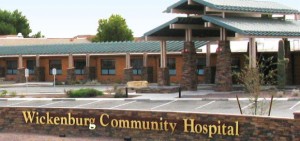WICKENBURG, Ariz. — Wickenburg residents in need of emergency medical care for a stroke may benefit from a Mayo Clinic telestroke program that is now be available at Wickenburg Community Hospital.
A recent agreement between Wickenburg Community Hospital and Mayo Clinic in Arizona means the service featuring a remotely controlled, self-propelled robot is now available in Wickenburg.
Mayo Clinic was the first medical center in Arizona to do pioneering clinical research to study telemedicine as a means of serving patients with a stroke in neurologically underserved rural and urban settings, and today serves as the "hub" in a network of 15 other "spoke" centers in 4 states. Wickenburg Community Hospital is the 16th hospital to be part of the telestroke service from Mayo Clinic in Arizona.
When Mayo Clinic began its stroke telemedicine program in 2005, statistics illustrated that 40 percent of residents in Arizona lived outside an area with immediate stroke expertise. In telestroke care, the use of a telestroke robot located in a rural hospital lets a stroke patient be seen in real time by a neurology specialist at Mayo Clinic located in Phoenix. The Mayo stroke neurologist, whose face appears on the screen of the robot, consults with emergency room physicians at the rural sites and evaluates the patient.
Patients showing signs of stroke can be examined by the neurologist via computer, smart phone technology, portable tablets or laptops. In addition to assessment of the patient, the neurologist can view scans of the patient's brain to detect possible damage from a hemorrhage or blocked artery.
A major benefit of the collaboration is that patients with stroke symptoms who meet the criteria can often be administered clot-busting medications within the narrow window of time necessary to minimize permanent injury to the brain.
"Excellent, capable emergency physicians at Wickenburg Community Hospital can ring the telestroke hotline and be instantly connected with Mayo Clinic's stroke experts," said Bart Demaerschalk, M.D., Professor of Neurology, and medical director of Mayo Clinic Telestroke. "Urgent and immediate virtual care can be provided to patients - collaboration between stroke neurologists and physicians at the remote sites has resulted in 96 percent accuracy in diagnosing stroke."
“Our mission is to provide quality health and wellness services where the patient, family and community come first. This newly formed partnership with the Mayo Clinic is another step towards achieving that mission,” Linda Brockwell, Chief Nursing officer at Wickenburg Community Hospital says. “In collaboration with the stroke neurologists and our emergency department providers, immediate, life-saving interventions can begin shortly after the patient enters the ED. This new service provides the patient better care and will ultimately save lives.”
To date, more than 5,000 consultations for neurological emergencies between Mayo Clinic stroke neurologists and physicians at the spoke centers have taken place. Dr. Demaerschalk says these comprehensive evaluation techniques lead to appropriate life-saving treatment for stroke and have resulted in significant cost reductions in terms of ground and air ambulance transfer of patients to another medical center.
Dr. Demaerschalk explains that telestroke robot technology is not intended to replace face-to-face communication with patients.
"But our research strongly suggests that the technology can enhance evaluation and treatment for patients in underserved areas, as well as peer-to-peer collaboration among physicians," he says.
It is estimated that more than 45 percent of Americans live more than 60 minutes away from a primary stroke center. If a stroke has occurred, "every minute is precious," notes Dr. Demaerschalk.
Additionally, researchers have found that telestroke care appears to be cost-effective for rural hospitals that don't have an around-the-clock neurologist, or stroke expert, on staff. The research is published in the September 14, 2011, issue of Neurology, the medical journal of the American Academy of Neurology.
The Mayo Clinic Telestroke Network also includes Arizona hospitals in Phoenix, Casa Grande, Kingman, Flagstaff, Parker, Cottonwood, Sedona, Tuba City, Globe, Yuma, Bisbee and hospitals in St. Joseph, Mo., Lebanon and Manchester, N.H., and Las Vegas and Henderson Nev.
About Mayo Clinic
Mayo Clinic is a nonprofit worldwide leader in medical care, research and education for people from all walks of life. For more information, visit www.mayoclinic.com and www.mayoclinic.org/news.
MEDIA CONTACT:
Jim McVeigh, Mayo Clinic Public Affairs, 480-301-4222, mcveigh.jim@mayo.edu
Roxie Glover, Wickenburg Community Hospital, 928-684-3219, Roxie.glover@wickhosp.com








